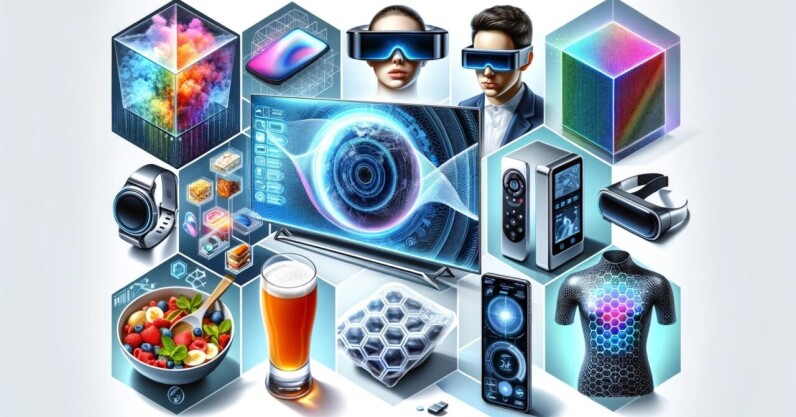#Digital displays and the end of the ‘screen age’

Table of Contents

Over the past seventy years, we’ve seen displays seep into almost every aspect of our lives. We had televisions arrive in our homes, reshaping news and entertainment. Hot on their heels came smartphones, which changed communication and how we interact with the world at large.
This tech altered the globe in ways we continue to grapple with, but it still doesn’t tell the full story of digital displays. Alongside these epoch-defining examples, there are a myriad of smaller ways screens have altered our lives; from making it easier to use public transport all the way through to quickly ordering a meal at fast food restaurants.
It seems that as our world becomes more complex, screens multiply in kind. Yet will this trend continue? As technology evolves and advances, will digital displays keep being integral in our lives? And how will they change?
Screens… What’s next?
TNW Conference 2024 – Calling all Scaleups to join on June 20-21
Showcase your scaleup in front of investors, change-makers and potential customers with our curated Scaleup package.
With this in mind, I got in touch with Alexander Mogg, lead partner monitor at Deloitte. He explains that the three main elements of screens that will change in the near future are their size, shape, and form.
The first is all about variation. Currently, most screens we use in our day-to-day lives tend to be of the same broad size: somewhere between our phone and the television. This is likely to shift, so displays have more variance and are everything “from super small to super large.”
The next expected change is that the general shape of screens will abandon “the traditional rectangle.” This would mean screens will be no longer chained to quadrilaterals, and can be used in more and more places.
The final evolution will be a modification of form. Specifically the introduction of more curves, “three-dimensional designs,” and the rise of foldable models.
Summing this all up, Mogg believes we’ll see screens evolve for “all sorts of use cases and places,” becoming even more ubiquitous in the process.
Keen to find out how this might become reality, I spoke with Marcin Ratajczak from Inuru, a German company that claims it will revolutionise screen technology.
Leading with OLED
Inuru’s main advancement has been developing a brand new way of manufacturing OLED displays. It recently raised €9.5mn in funding for producing low-cost OLED and has just opened a factory near Berlin to do so.
OLED (organic light-emitting diode) is a marvel of modern displays. It’s paper thin, flexible, bright, and has a high contrast ratio. A large amount of premium technology uses this tech, from the latest Nintendo Switch to high-end televisions.
As someone who has literally just purchased their first OLED TV, take it from me, it’s incredible.
Yet, as Ratajczak points out, it has one big drawback: “it’s super hard to manufacture.” This is why OLED screens are generally only used in premium devices, but what Inuru has achieved is developing and patenting a new way of making the technology.
Printing screens
In simple terms, the most intensive part of manufacturing OLEDs is applying the organic, emissive layers (where the light is created) onto the substrate, the material that hosts these lights. This is often done via vacuum thermal evaporation (VTE) or organic vapour phase deposition (OVPD). While these are different methods, each involves evaporating the organic molecules before cooling them onto the substrate.
What Inuru has done is to create a different way of doing manufacturing OLEDs. “We have basically ditched the entire semicon evaporation standard process that we have right now in favour of simple colour printing,” Ratajczak says.
Effectively, Inuru is spraying OLEDs directly onto a substrate, just like how ink is sprayed onto paper in inkjet printers.
This, according to the company, allows them to produce OLEDs with only 1% of the energy and materials required for the standard process, reducing manufacturing costs of the technology by 90%.
While there are still advancements to be made, this untethers OLED from the cost constraints that it previously had, opening up an entirely new avenue for high-quality displays in different shapes and sizes.
A new way of looking at screens
One area that Ratajczak and Inuru are particularly interested in is the impact screens could have on “marketing and labelling.”
For example, being able to use this technology on bottles of medicine. In the technology’s current state, this involves a label lighting up when the drugs reach their expiry date. However, this could expand to include things like displaying changes in dosage rates, or even if someone had taken their allotted amount that day.
Ratajczak sees screen technology rocketing beyond this though. While it’s currently limited to areas lighting up, the fast pace of its evolution could create a much bigger impact. For example, he talks about using displays on clothing as a fashion statement, or having animated displays on products.
Another use case Ratajczak mentions is the idea of “reusable packaging that we share.”
Think of it this way. We buy a bag of pasta. Rather than a label, it features a flexible screen that displays the company’s branding. When the product is finished, rather than throwing the bag away, it’s cleaned, and another company’s product is inserted. The screens surrounding the bag change to show this product and its branding.
It’s an alluring idea, but one I have my doubts about. Surely it would be easier to create a proper, circular packaging system using easily recyclable materials than plastering cheap screens over everything?
Whatever the actual cost-benefit analysis is, this does help illustrate one future of screens: so cheap and common they can almost replace paper. Saying that, there are some possible roadblocks for the technology roaring right around the corner.
The death of displays
Is it any surprise that a company making screens thinks the future involves a lot of screens? Of course not — and our relationship with digital displays could go in a different direction.
One element seems inarguable: companies want the option to have screen-like things everywhere. Imagine just how much a business would pay to have the first affordable animated packaging, for example.
But we do not necessarily need screens to achieve this. Instead, augmented reality (AR) may be the next step in screen evolution.
Today, Mogg tells TNW, there are many examples of companies releasing apps where “customers can view [a] package through their camera to see additional virtual information or interactive content displayed on their screens.”
Smart glasses taking over?
AR in this form is too fiddly to overcome actual screens, but you know what will? Smart glasses. Things like Apple’s Vision Pro and the Ray Ban Meta Smart Glasses are a sign of the ambient computing revolution that’s coming round the corner.
When this happens, it’s likely we’ll look at a product in a store and an animation or more information will be automatically shown on our lenses. This will be less intensive — both labour- and money-wise — than screens and will allow companies to reach us no matter where we are. For them, it’s a win win.
So, could this be the end of digital displays? Are we just waiting around until smart glasses get good and cheap enough?
Well, Ratajczak believes this won’t be the case, saying that screens will blend with augmentation, helping users “get the same information from the digital world in the physical one.”
This makes a certain amount of sense. Think of something like a medicine bottle. Even in a screenless world, one might want to be able to see an expiry date flagged on it.
Mogg from Deloitte has a different view though, believing that, in time, AR/VR will dispense of screens entirely. “The use cases are just too striking,” he says.
This doesn’t mean it’ll happen soon, but he thinks that as soon as smart glasses get good enough, the screen age will begin winding down.
The end of the world as we know it
Despite this, we’re still likely to hit an inflection point in the near future where screens are everywhere — but is this a good thing?
When I brought this up to Mogg, he pointed to a range of potential issues, including distraction and security risks, as there will be more attack vectors, but ultimately he thinks “the productivity increase in using screens will offset a lot of these impacts.”
(Ratajczak, on the other hand, was unsurprisingly positive about all the good things that screens can bring.)
But personally? It’s hard not to see a world where we’re utterly bombarded with screens as somewhat negative. As a society, we’re already suffering from increased anxiety and depression, much of which is driven by screen time and social media. Will more displays remedy this? Somehow, I doubt it.
The worry, of course, is that AR/VR will make things worse. That at least with screens we can turn them off or ignore them. When the technology is in front of us, plastered over our eyes, then it may be truly inescapable.
The problem is that there’s no clear way of mitigating this. The benefits that more screens and displays can deliver us in terms of convenience — and the profits they can deliver companies — are so strong that it’s likely to happen one way or another. No one surveyed us on whether we wanted ordering stations in fast food restaurants, they simply appeared and we found them useful. The same thing will happen with this next step in the display revolution.
Perhaps we need regulation, or perhaps the change will come and we’ll simply adapt, just like with the internet.
One thing’s for certain though: while we still live in the screen age, it’s not going to last forever.
If you liked the article, do not forget to share it with your friends. Follow us on Google News too, click on the star and choose us from your favorites.
If you want to read more like this article, you can visit our Technology category.



